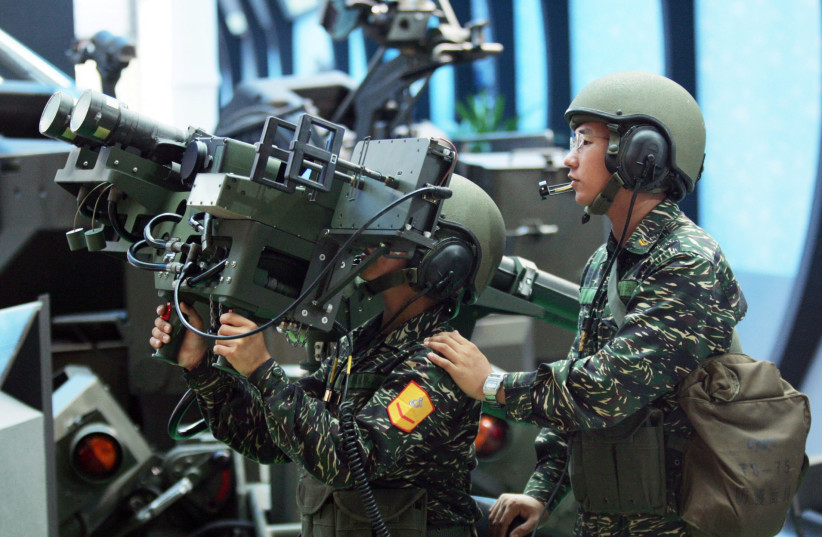The Biden administration is urging US House Speaker Nancy Pelosi to cancel her upcoming trip to Taiwan because the Communist Chinese are complaining about it. American friends of Taiwan are understandably concerned by the administration’s pressure on Pelosi. American friends of Israel should be, too.
China, which does not recognize Taiwan’s right to exist, has threatened to take unspecified resolute and forceful measures, if the speaker of the US House of Representatives dares to exercise her right to visit one of America’s most important allies.
It’s troubling to see that President Joe Biden already seems to be leaning toward appeasing Beijing. Biden said, last week, that the Pelosi trip “is not a good idea.” The New York Times reports that Biden administration officials are “quietly work[ing] to dissuade” her from going.
What's going on here?
It might seem at first glance that the Pelosi-China-Taiwan controversy has nothing to do with Israel. But in fact, it could have very serious implications for Israel. There has always been a struggle among US foreign policymakers between two broad approaches to international relations.

One approach is that the US should always stand by its allies, no matter what. This is both a matter of principle and strategy. The principle is that America should do the right thing. The strategy is that letting a dictatorship, such as China, bully America into abandoning Taiwan will lead to other dictators bullying the US into other surrenders.
The second approach is a 21st-century version of the old Neville Chamberlain mindset of appeasement. Let our allies fend for themselves. Protect only America’s most narrow interests. Insulate the US inside a military and psychological fortress and hope the bad guys will leave the US alone.
But the events of the last few decades have reminded us that the world has become too small for the US to cut itself off and close its eyes to the fate of smaller countries. The Fortress America concept can’t work. Terrorists don’t always stay in Afghanistan, sometimes they come over to the US and fly planes into the World Trade Center.
This is where Israel comes into the picture. The question of which of these two mindsets will prevail in US foreign policy will ultimately determine not only how America treats Taiwan but how America treats Israel, too.
How does Israel fit into this?
ISRAEL DOES not expect American troops to rush to its defense, but it would be counting on airlifts of US weapons in the event of another Arab invasion. And an isolationist-minded US administration might decide that political and other calculations make American involvement too risky.
Israel has had some experience with what happens when political calculations outweigh principles. On the eve of the 1973 Yom Kippur War, secretary of state Henry Kissinger pressured Israel not to strike first and then delayed arms shipments for ten days to ensure that Israel did not win too decisive a victory. He was afraid that an Israeli defeat of the Arabs would, among other things, anger the Arabs’ patron, the Soviet Union.
So, Israel had to become the sacrificial lamb to Kissinger’s detente policy. The idea that America should, as a matter of principle, stand by its ally Israel was not part of Kissinger’s mindset.
Five years later, it was Taiwan’s turn to become the sacrificial lamb. In December 1978, president Jimmy Carter announced that the US was unilaterally abandoning its mutual defense treaty with Taiwan, terminating diplomatic relations with Taipei and recognizing Communist China as the sole legal government of all of China.
The president who abandoned Taiwan in 1978 was the same president who condemned Israel’s presence in Jerusalem, embraced the Palestinian cause, shipped advanced weapons to Arab regimes that were still at war with Israel and pressured Israel to prematurely withdraw from its security belt in southern Lebanon. By the time he left office, Jimmy Carter was widely regarded by American Jews as the least friendly-to-Israel president in US history.
It’s all a matter of mindset. A US administration that views America’s allies as expendable will see Israel that way, too. A president who abandons Taiwan will also abandon Israel.
That’s why the fate of Pelosi’s planned trip is so important. This one trip may seem like a small matter but its ramifications will be felt by America’s allies around the world.
The writer is an attorney and the father of Alisa Flatow, who was murdered in an Iranian-sponsored Palestinian terrorist attack, in 1995. He is the author of A Father’s Story: My Fight for Justice Against Iranian Terrorism.
